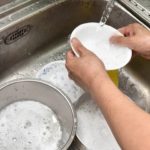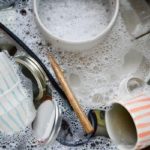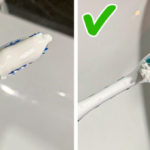The Benefits of Using Hot Water to Wash Dishes
Washing dishes with hot water brings numerous advantages to the household, and this practice also helps to ensure the family’s health and safety.
Specifically, washing dishes and utensils in hot water with dish soap helps to quickly remove stains and grease. This also minimizes the time spent scrubbing and optimizes dish soap usage.
The bacteria on dishes and utensils are usually killed instantly, ensuring the most hygienic result for your family’s dishes and utensils.
Water temperature below 30 degrees Celsius will leave an unpleasant greasy film on the items when they are used for the next meal. Therefore, washing dishes with hot water will more effectively cut through grease and oil compared to using cold water.
For plastic food containers, pots, and pans that are greasy, simply soak them in hot water with a little salt, then wash them with dish soap to remove both the grease and any lingering food odors.
For plastic bowls and dishes, it is recommended to soak them in hot water and then wash them with dish soap. Rinsing with hot water not only helps to quickly clean the dishes but also ensures they dry faster and do not become damp and moldy, which could affect your health when used again.
For bamboo items such as chopsticks and cutting boards, soak them in hot water to both disinfect and save scrubbing time. When these items show signs of mold, soak them in hot water two to three times, and the mold will disappear.

Mistakes to Avoid When Washing Dishes to Prevent Unsanitary and Harmful Conditions
Rubbing a bunch of chopsticks together: Many homemakers tend to rub a bunch of chopsticks together, thinking that it is a quick, convenient, and effective way to clean them. However, this method damages the outer protective layer of the chopsticks, creating tiny cracks that make the surface rough and an ideal environment for microbial growth. This practice can also cross-contaminate harmful microorganisms or infectious diseases from one person’s chopsticks to another’s.
It is best to use a dishwashing sponge to clean each chopstick individually to remove grease and soap suds. If the chopsticks are greasy and difficult to clean, you can rinse them with hot water first, then wash and dry them thoroughly or sun them.
Not drying dishes and utensils before storing: Many people wash their dishes and then immediately store them in a cabinet to avoid dust. However, a closed and humid environment can promote bacterial growth. Stacking wet dishes and utensils can also cause unpleasant odors and unsanitary conditions. If you don’t have a dish dryer, it is recommended to air-dry the dishes thoroughly with a water-absorbent cloth before putting them away. Place the washed dishes and utensils in a well-ventilated, dry area to ensure they are clean and dry for the next use.
Not washing dishes and utensils immediately after meals: Many families have the habit of not washing dishes and utensils right after eating, instead waiting until they need to use them again. This habit allows food residue to remain on the surfaces, creating an environment for bacterial growth, which can affect the family’s health. Therefore, it is recommended to rest for 15-20 minutes after a meal and then wash the dishes and utensils. Avoid leaving them until the next morning or letting them sit overnight.
According to Khoevadep
5 Everyday Chores You’re Doing Wrong Without Realizing It
Introducing the 5 Daily Chores You’ve Been Doing Wrong: A Guide to Optimizing Your Routine
We often get so accustomed to our daily routines that we don’t stop to question if we’re doing things the most efficient or effective way. It’s time to break free from these habitual mistakes and transform your daily chores into a seamless, streamlined routine. From simple solutions to common pitfalls, get ready to discover a whole new world of domestic efficiency.

































